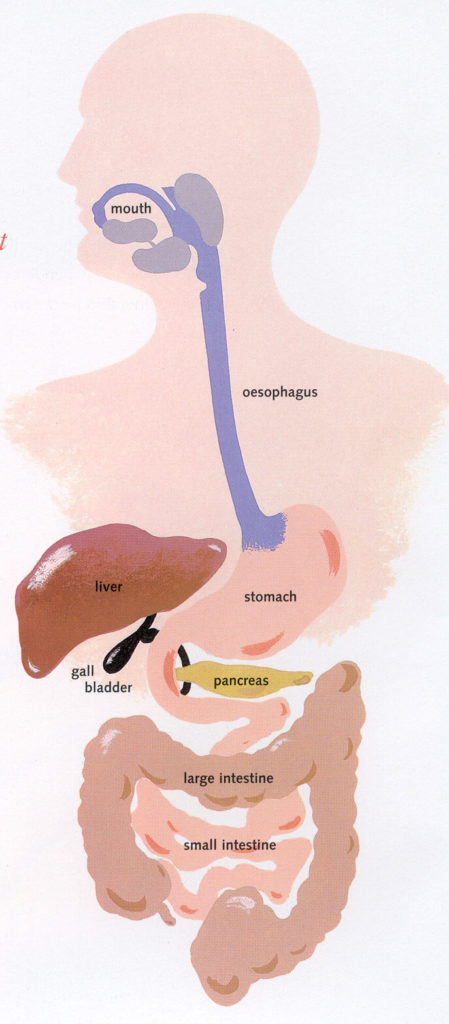Hippocrates, the ancient Greek physician and “Father of Modern Medicine,” once said that all disease starts in the gut.
Although not entirely true, it was a perceptive observation. When gut health is compromised, the risk of disease and disorder rises markedly.
What else happens when you have an “unhealthy gut,” though?
Is it harder to lose weight? Do you get bloated more often? Can it cause lethargy, weakness, and depression?
And for that matter, what is a healthy gut, anyway? And what do you really have to do to get one?
Do you need to avoid all the foods you like to eat? Buy supplements? Learn to love rotten bacteria teas?
Well, we’re going to get answers to all those questions and more in this article. By the end, you’re going to understand what your “gut” actually is, what determines whether it’s healthy or not, and how to keep it in fine fettle.
What Is Your “Gut”?

Many people think the gut is simply the stomach, but it’s much more than that.
It’s your entire digestive system, starting with your mouth and teeth, and moving on down, your esophagus, stomach, small intestines, and large intestines.
It’s basically a long assembly line, with each section performing a separate job, and here’s what it looks like:

As you can see, everything begins in your mouth, where food is mashed up and mixed with saliva.
Then, the esophagus shuttles the chewed food into your stomach, where acid and contractions turn it into slush.
That slush is then pushed into the small intestine, where nutrients are absorbed into your bloodstream.
The remaining food particles make their way into the large intestine, where they’re broken down by bacteria.
Finally, the unabsorbed remnants are, well, you know.
What is a “Healthy” Gut?
As you can imagine, with a system as complicated as this, there are many ways for things to go wrong.
Bacteria like H. pylori can infect the stomach lining and cause ulcers. The appendix, a small pouch at the end of the colon, can become infected and release toxins into the blood. The esophagus can become damaged by different medications or allergic reactions. You can contract fungal species that impair the absorption of various nutrients.
The good news, though, is that your body does a fantastic job at preventing major malfunctions like these. And even if they do happen, they’re usually fairly easy to fix.
That’s not what we’re talking about with “gut health,” though.
Instead, we’re talking about the bacterial landscape in the large intestine, which is getting a lot more attention now than it used to.
Researchers have known for decades that bacteria are involved in digesting food, but it’s only in the last twenty years or so that they’ve learned just how much of an impact this has on the rest of the body.
You see, there are about as many bacterial cells in your body as human cells, and they’re collectively known as your “microbiome.”
Most people have about 160 different kinds of gut bacteria, and the exact makeup of your microbiome is affected by different factors such as your diet, geographic location, and genetics.
For a long time, scientists considered gut bacteria essentially as digestive aids, but we now know that the variety and quantity of bacteria affect our overall health and well-being in a number of ways.
For example, they break down toxic compounds that would otherwise be absorbed into your bloodstream.
They can enhance your immune system and create health-promoting compounds like short-chain fatty acids, which are molecules that have been linked to various health promoting effects, including a reduced risk of inflammatory diseases, diabetes, and cardiovascular disease.
They can also affect your gut-barrier function, which regulates which molecules should be allowed to escape the colon and enter the bloodstream and which shouldn’t.
Under normal circumstances, your body absorbs everything from food that it needs and leaves everything else in the GI tract, to be pooped out. Inevitably, though, undesirables manage to sneak through your colon’s defenses.
If these defenses become compromised, too many toxins and disease-causing bacteria are able to get into your blood, where they can cause all kinds of health problems.
Having a healthy collection of gut bacteria also prevents unhealthy, disease-causing bacteria from taking their place.
You see, there’s always a rogue’s gallery of “bad” bacteria vying for dominance in your gut, and you always want the “good guys” to outnumber and suppress them.
When a large number of beneficial bacteria die, though, due to things like disease, poor diet, or antibiotics, it opens the door for the bad bacteria to take over and wreak havoc on your health.
This imbalance between the number of good and bad bacteria in your GI tract is known as dysbiosis, and it can cause myriad problems ranging from the annoying to the debilitating. For example…
- There’s evidence that poor gut health can increase the risk of obesity.
When you transfer the gut bacteria of obese mice to mice with no gut bacteria, they gain weight and develop insulin resistance.
- Low levels of healthy gut bacteria are associated with many gastrointestinal diseases, such as inflammatory bowel syndrome (IBS) and disease (IBD).
Irritable bowel syndrome is a gastrointestinal disorder whose symptoms include chronic abdominal pain or discomfort and diarrhea, constipation, or alternating bouts of the two.
People with IBS are also more likely to have other disorders such as fibromyalgia, chronic fatigue syndrome, chronic pelvic pain, and temporomandibular joint (TMJ) disorder.
IBD is a more serious condition that produces similar symptoms but, unlike IBS, can cause permanent damage to the intestines, intestinal bleeding, and other harmful complications.
- Your gut health influences mood and brain function.
Your gut has a complex network of nerves that control intestinal function.
This communication system is known as the “gut-brain axis,” and it plays a role in the production of powerful neurotransmitters such as serotonin, which can profoundly affect how you feel and perceive your environment.
In this way, your gut health can have a major impact on your behavior and psychological and emotional states, which helps explain why gut dysbiosis has been linked to stress, anxiety, depression, and even autism.
As you can see, many aspects of your general health mirror your gut health.
What, then, does a healthy gut look like?
Well, scientists don’t exactly know, yet.
There are tests to see if you have a severe imbalance between good and bad bacteria, but we can’t say for certain what the ultimate goal is.
That said, researchers have identified several ways to support your microbiome’s good gut bacteria and thus keep your gut as healthy as possible.
And if your first thought here is “supplements,” well, let’s take a look at that…
Can Supplements Give You a Healthy Gut?

If there’s even a shred of evidence that something sorta kinda maybe can improve your health or body composition, you can rest assured someone will be peddling supplements for it.
Most are worthless, but oh how they sell.
Well, the two most common kinds of supplements advertised for gut health are prebiotics and probiotics, which sound the same, but are very different.
Prebiotics are a kind of digestion-resistant fiber that serves as fuel for the healthy bacteria in your gut.
Probiotics, on the other hand, are contain live bacteria meant to reinforce the ranks of good bacteria already in your intestines, and add new beneficial types that aren’t already present.
In short:
- Prebiotics: Food for good bacteria.
- Probiotics: Good bacteria in supplement form.
Now, prebiotics are vitally important for maintaining a healthy population of gut bacteria. If your prebiotic intake is low, your gut is going to suffer.
That doesn’t necessarily mean you need to supplement with prebiotics, though. Instead, you can get everything you need by regularly eating a variety of fruits and vegetables.
For example, most studies that have found positive effects from prebiotic supplementation used doses of about 4 to 20 grams per day, and one medium sized banana has about 6 grams of prebiotics.
So, if you eat 2 to 3 servings of both fruits and vegetables per day (like you should be), along with some whole grains, your diet alone will suffice for prebiotic intake.
There’s no need for supplementation.
In the case of probiotics, supplementation may make more sense.
Studies have shown that probiotic supplements can benefit your health in a number of ways, including lowering inflammation levels and the risk of dental cavities and respiratory tract infections, alleviating allergies, and improving cholesterol levels.
There’s also evidence probiotics can increase the absorption of vitamins and minerals from food.
There are problems with probiotic supplementation, though:
1. Many probiotic supplements contain dead bacteria or are poorly formulated.
They’re either underdosed or processed in such a way that all the bacteria are killed, which is particularly common in supplements that combine probiotics with other ingredients.
2. We don’t know enough yet about which bacteria are helpful and which aren’t.
Probiotics aren’t all the same.
For example, if a specific kind of Lactobacillus helps prevent an illness, that doesn’t necessarily mean that another kind of Lactobacillus would have the same effect or that any of the Bifidobacterium probiotics would do the same thing.
3. We don’t know enough about who can really benefit from taking probiotic supplements.
Most of the studies on probiotics have been conducted with people with some kind of illness or health condition, so it’s not clear if their benefits would also apply to healthy people.
And even for the conditions that have been studied the most, researchers are still working to find how probiotics can fit into a treatment regimen.
The 4 Best Ways to Have a Healthy Gut

If pills and powders can’t give you a great gut, what can?
Well, despite what the magazines and “gurus” might say, it’s actually quite simple and straightforward.
All you have to do is…
1. Eat plenty of fruits, vegetables, and other kinds of fiber.
The American Dietetic Association recommends at least 25 grams of fiber per day for women and 38 grams per day for men.
Most Americans eat about 15 grams per day, which is a problem for many reasons, and one of them is gut health.
Many people have turned to fiber supplements to help, and while they can make sense if you’re having trouble eating whole foods, they don’t provide the whole array of micronutrients found in food.
That’s why the majority of your fiber should come from fruit, vegetables, whole grains, and other fiber-rich foods.
As mentioned earlier, if you simply include 2 to 3 servings of both fruits and veggies in daily meal plans, you’ll have all your bases covered.
Here are a few easy ways to do this:
- Mix fruits and vegetables into your main dishes. For instance, make a vegetable-based casserole.
- Prepare meals ahead of time and choose recipes with fruits and vegetables. (This is one of the reasons meal prepping can be so helpful).
- Keep fresh fruits and vegetables easily accessible throughout the house, so they’re always at hand.
- Pack fruits and vegetables as snacks for work.
2. Eat a variety of different foods.
Research shows that hunter-gatherer societies generally have more diverse gut bacteria than people in Western cultures, and scientists believe this is probably due to the wider variety of foods eaten.
This makes sense when you consider that every food, even non-fibrous ones, contains different kinds of bacteria.
Thus, the more types of foods that you eat, the more types of bacterial species your gut is exposed to, allowing it to recruit a more diverse cast of helpers.
3. Eat bacteria-rich foods.
Foods such as yogurt, kimchi, sauerkraut, and kombucha contain large amounts of beneficial bacteria.
You don’t need to eat one or more of these at every meal, or even every day, but eating fermented foods a few times per week can improve your gut health.
4. Stay active.
Studies show that people who exercise more often generally have a more robust microbiome than sedentary people.
There are a variety of reasons for this, but it’s probably mainly due to exercise’s anti-inflammatory effects in the gut, which promotes the growth of good bacteria.
The Bottom Line on Gut Health
It’s easy to get confused when you start looking into gut health.
It’s a complex topic, and a quick Google search serves up all kinds of diet and supplement recommendations, which makes it even more daunting.
Fortunately, as with diet and training, sensible application of the fundamentals is all you really need.
If you follow the simple “healthy eating” guidelines outlined in this article and stay active, you’ll keep your digestive system humming along.
If you already have some kind of gut bacteria imbalance, though, or you’re experiencing symptoms like diarrhea, cramps, or gas, then you may need to take more specific steps to reverse the damage.
That may involve probiotic supplementation, elimination dieting, or something else, so I’d recommend that you speak with your doctor first.










